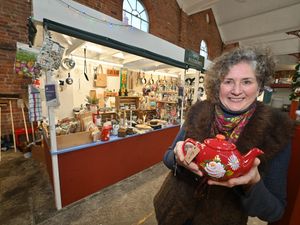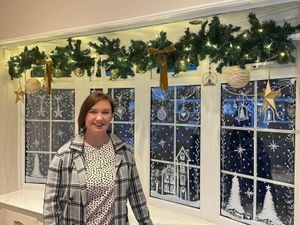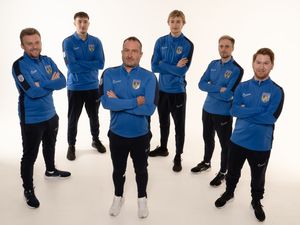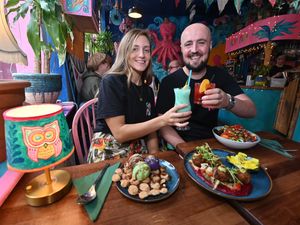A small wonder: Meet the miniature makers at Birmingham show
Miniature models are a downsizing delight for one couple. . .
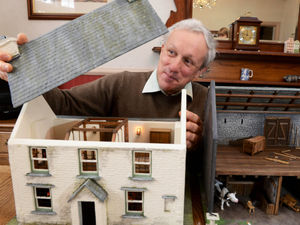
It is the little things in life that matter to Peter and Kate Kelsall. A shared fondness for the rugged beauty and charm of the Lake District has helped to inspire an array of miniature worlds.
The couple have built a reputation for their true-to-life dolls houses, which have gone on to take pride of place in homes around the globe.
Based on real Lakeland properties, their intricate models range from a traditional copper miner’s cottage and an 18th century barn to homes based on the stories of much-loved author Beatrix Potter, another champion of the beauty spot.
The couple, who live in Cannock, have managed to combine Kate’s interests in both the dolls house hobby and social history with Peter’s model making skills.
They regularly use their visits to their favourite beauty spot to carry out research into the local architecture to get food for thought for new creations for their business Herdwick Landscapes.
“We love the Lake District and I had a Victorian dolls house already but I really wanted a Cumbrian cottage but I couldn’t find one. At the time I wasn’t working and Peter had taken redundancy from his job so he decided to have a go at making one for me.
“When it was finished we showed it to Dolls House World and they said it was so good that we could sell them and that’s how it started. The timing was perfect,” explains Kate.
“I had always been interested in model-making, mostly tanks, ships and planes, so I thought I would give it a go and I’ve picked up the other skills along the way.
“When we first started no one was really doing what we were doing at the time. We wanted to build houses that looked like houses because at the time there were a lot of flatpack kits.

“We wanted them to be as realistic as possible without any unsightly backs. We wanted them to look good from every angle. People liked that our houses had a sense of history and character, we were a breath of fresh air,” adds Peter.
At the moment they have about 25 houses modelled on the classic stone buildings found in the Lake District in their range, although they’ve had 50 different ones since they began in 2007. “We like to keep offering something new, we didn’t want to be churning out just the same houses over and over again,” Peter tells us.
Most of their models are created in 1/24th scale, which has the measurement equation of 1/2 inch to one foot, and 1/48th scale which is 1/4 inch to one foot. “We’ve found that 1/48th scale has become more popular because people don’t have so much room these days for the bigger houses. They want something small enough to put on a shelf over the fireplace or on a bookcase,” says Peter, aged 55.
The couple, who also use books about Lake District architecture to help with inspiration for their models and to ensure they are as authentic as possible, will start each project by drawing it out on paper first.
Once they are happy that all of the dimensions are correct, they transfer their design to a computer drawing programme connected to a laser cutter.

When they first started the pieces were hand cut by Peter, which proved to be quite time-consuming, but the laser cutter takes less time and enables the parts to be exactly the same size every time.
“The house shells are made mostly from MDF but other wood including pine and jelutong will also be used for some of the fittings. They are then painted to give them the classic Lake District appearance and made to look ‘weathered’ so they look the correct age.
“A lot of thought goes into it before the cutting starts. I enjoy the designing, getting it all down with pen and paper first, working out how it’s going to fit together so you can’t see where it opens and how it’s going to look when it’s finished,” says Peter.
They recently began making ‘starter homes’ which are more basic houses, which they hope will appeal to those with smaller budgets and encourage more people to take up the hobby.
They also sell Kate’s vast range of around 250 pieces of furniture as well as other household and farm items all based on authentic period designs along with working lights and fireplaces that also light up.

“We go around National Trust properties looking at the furniture and I’ll be under the tables seeing how they were made. When I was at school I couldn’t do the boy’s subjects of woodwork and metalwork but I really wanted to do woodwork so now I can. I love it when a piece comes together,” says 65-year-old Kate, who uses the same drawing programme to cut out some of the pieces and will also age items to show the appropriate wear and tear.
She enjoys researching her pieces as well as designing them especially when a customer asks for something new that she doesn’t already have in her range. “I like the challenge, sometimes it doesn’t work but most of the time it does and it looks really good,” says Kate.

The couple, who both previously worked for the Post Office, also do bespoke commissions which can include replicas of existing properties and customer’s own homes as well as fantasy creations based on just an idea or a dream.
Projects have included a 1/48th scale model of Down House, the home of Charles Darwin, for a geological museum in Kent to provide a centre piece for an exhibition on the evolutionary biologist. It was built as the house appeared while Darwin was in residence in the late 1870s.
They have also created a 19th century house for a customer who wanted to remember holidays at the home of her husband’s cousin near New York.
“This was a big house to build and because it was three rooms deep I had to work out how it was going to open so that you could access all of the rooms.

“People want to be able to furnish their houses so it’s important to work this out and we need to make sure we’ve left enough room for the furniture to fit inside the rooms,” says Peter, who says one of his favourite creations is a 1/48th scale modelled on Arnside Tower, a late 14th century fortified tower house in Cumbria.
While one of the more unusual orders was for a 1/24th scale fantasy house from a client in The Netherlands. Their only request was for a Tudor-style look with Brambly Hedge elements that would be suitable for a family of mice leaving the pair to let their imaginations fill in the rest.
Peter adds: “I think we are the only people that will, when someone says can you build whatever it is they want and in whatever scale they want, say ‘we’ll have a go’.”
Peter and Kate are at the Miniatura show at NEC Birmingham today and tomorrow. To find out more see www.herdwicklandscapes.co.uk

